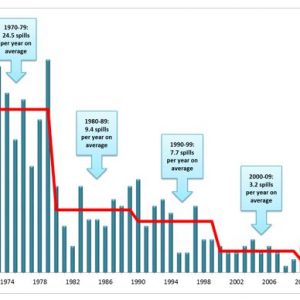Holy Cow!
Some things in the petroleum sector have our heads spinning of late. We are seeing new strategic positioning with regards to impending environmental regulations and policies. No mere tweaking of positions, we seem to be seeing the stirrings of a wholesale shift in some long-entrenched positions. While I am not naïve and it is unclear the particular motivator here (New plans? New tech? New economic or social or political calculations?), there certainly appears to be what might turn into a sea change within Big Oil circles.
Exxon Likes Da Carbon Tax?!?
We can start with Exxon and carbon taxes. ExxonMobil has long been seen as an outsider relative to mainstream oil producers when it comes to grappling with climate change and associated concerns. Many of our industry colleagues have long-noted Exxon’s distinct take on policies related to climate change, in both industry lobbying entities and as an individual actor on the global stage. Indeed, they were the central player in the #ExxonKnew controversy.
And so it was with some honest-to-goodness amazement that Exxon seems to be switching course here and has initiated direct support for lobbying efforts to craft some form of carbon tax policy/legislation at the federal level. Yep, you read that right.
As Axios‘ Amy Harder reported today, ExxonMobil now appears to be helping fund a multi-million dollar political advocacy campaign lobbying Congress for a price on carbon emissions (but we should note that ExxonMobile is a key funder of the Axios news service):
Why it matters: This is a significant turning point in Washington’s mostly static climate debate. Exxon officials have said for years they support a carbon tax, but they haven’t backed that up with actual lobbying dollars — until now.
This move increases the odds that Capitol Hill could consider big changes to climate and energy policy in the coming years.
The big picture: A seminal report released earlier this week by a UN scientific body underscored the growing urgency of climate change, the collective lack of will to address it, and how a price on greenhouse gas (GHG) emissions is an essential part of the solution.
Driving the news: Exxon, the world’s largest publicly traded oil company, has committed $1 million over 2 years to the political advocacy group, called Americans for Carbon Dividends.
- At $500,000 a year, that represents just over 4% of Exxon’s roughly $12 million annual lobbying budget in recent years, according to the Center for Responsive Politics.
- For a single legislative goal that isn’t articulated or even formally introduced yet, that’s significant.
Reality check: Washington politics don’t change overnight. Carbon taxes are politically toxic, particularly among Republicans who control the government at the moment and influential conservative groups like Americans for Tax Reform. Furthermore, climate and energy policy is low on Capitol Hill’s priority list.
Between the lines: Big Oil’s backing of any climate policy, or at the very least its non-opposition, is vital to a bill’s progress in Washington given the industry’s political influence.
- The fact that Exxon is putting money into the group, which launched in June, is likely to prompt other major oil and gas companies to put money into it too, according to multiple people close to the effort.
- The group has so far raised $3.4 million for 2 years, with expectations that it will get $5 million for the first year within 6 months, according to Ted Halstead, CEO of the group.
Go deeper: Read her full story in the Axios stream.
Saudi Arabia is now actively arguing their oil is the least bad?!?
A report in Science from some of my former colleagues at Stanford last month found that Saudi Arabia’s crude oil production has the lowest carbon emissions per barrel among major petro-players (note: Aramco was among the funders of this research, and provided access to an expensive commercial dataset, but didn’t influence the outcome or results, according to the authors; Other funders are listed in this summary).
In short, Saudi crude production averages roughly 5 grams of CO2-equivalent per megajoule, mostly due to production from their giant conventional fields requires minimal natural gas flaring. Most other Middle Eastern producers (e.g. Iran and Iraq) flare more, driving up their emissions’ intensity. In addition, Saudi crude is relatively less energy-intensive to extract and process compared to some other key producers, especially heavy and so-called “unconventional” sources like Venezuelan crude (which averages 20 grams of CO2) Canadian oil sands (which average roughly 18 grams. Our overall U.S crude oil production averages 11 grams (approximately the global average).
Reality
How much these shifts are being brought about by market forces and existing government policies remain unclear. But we should keep in mind actual conditions on the ground. While, newly released Energy Information Administration data shows that U.S. CO2 emissions from energy (the overwhelming source) dipped by another roughly 1% last year and are now 14% lower than in 2005, transportation-related emissions are actually going up (showing that the challenge of decarbonizing long-haul shipping, air travel, etc. remains a major challenge).
Also the cold (hot?) realties of climate change are only getting starker and starker, as most recently pointed out by yesterday’s IPCC report and the flurry of discussions that has prodded.
Regardless of the motivation for these new tacts taken by our Big Oil industry colleagues, this apparent change is welcomed and will hopefully foster more collaborative discussions such as we have enjoyed with medium- and small-scale producers in recent year. The path forward is collaborative and adversarial. These and related changes burbling up across the industry are positive. We look forward to continued engagement with the industry to improve safety and improved outcomes for everyone.





Leave a Reply